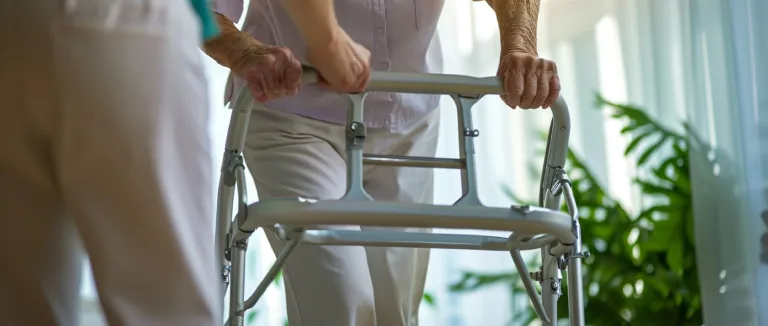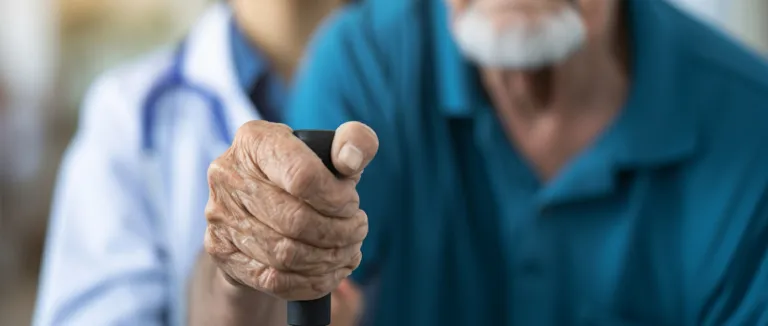What are the symptoms of Parkinson's disease?
The answer is complex, as it involves both motor and non-motor symptoms. Let's begin by discussing the motor symptoms, which are often considered the primary indicators of this condition.

Recognizing the Motor Symptoms of Parkinson's Disease
Motor symptoms of Parkinson's disease are:
- Tremors: Tremors are among the most recognizable symptoms of Parkinson's disease, usually beginning in the hands or fingers. These tremors often occur when the body is at rest and typically decrease with purposeful movement.
- Bradykinesia: This refers to a slowness of movement that makes everyday tasks more difficult and time-consuming. Individuals with Parkinson's disease might find it challenging to initiate or complete movements.
- Muscle Rigidity: Muscles can become stiff, leading to pain and a limited range of motion. Rigidity commonly affects the neck, arms, and legs.
- Postural Instability: People with Parkinson's disease often struggle to maintain balance, increasing their risk of falling. Postural instability can result in a stooped posture and make abrupt or quick movements difficult.
Symptoms Unrelated To The Motor
In addition to the obvious motor symptoms, Parkinson's disease can significantly affect a person's quality of life through a wide range of non-motor symptoms.
- Anxiety and Depression: Mood disorders such as anxiety and depression are more common in people with Parkinson's disease. These conditions can worsen existing symptoms and negatively impact overall well-being.
- Cognitive Changes: Some people with Parkinson's may experience cognitive symptoms like memory loss, difficulties with attention, and trouble solving problems. If left untreated, these issues can progress to dementia.
- Sleep Disturbances: Sleep problems are common among people with Parkinson's disease. These can include frequent nighttime awakenings, insomnia, and restless leg syndrome.
- Autonomic Dysfunction: Parkinson's disease can disrupt the autonomic nervous system, leading to symptoms such as constipation, drops in blood pressure when standing (orthostatic hypotension), and urinary difficulties.
What are the 40 symptoms of Parkinson's disease? While it isn't practical to cover all forty symptoms in a single article, the motor and non-motor symptoms described above provide a comprehensive overview of the many challenges faced by people with Parkinson's disease.

Early Identification And Action
Recognizing the early symptoms of Parkinson's disease is crucial for starting treatment promptly, which can help manage symptoms and improve quality of life. Early detection is often the first step toward receiving a proper diagnosis.
- Micrographia: A gradual reduction in handwriting size”micrographia”is a subtle but early warning sign. People may notice that their writing becomes smaller and more cramped over time.
- Loss of Smell: Anosmia, or reduced sense of smell, is a possible early indicator of Parkinson's disease. Changes in the ability to smell often appear years before other symptoms.
- Softer or More Monotone Speech: Parkinson's disease can affect the muscles used for speech, resulting in voices that sound softer or more monotone. This change is usually noticeable both to the individual and those around them.
- Reduced Facial Expression: Also called a "masked face," this refers to diminished facial expressiveness. Affected individuals may struggle to show emotion through their expressions, making their faces appear less animated.
If you have questions about the symptoms of Parkinson's disease, our experts at Liv Hospital in Istanbul are here to help. Reach out today for trusted information and support.
Seeking Expert Advice
If you or someone you know is experiencing any difficulties, it is imperative that you seek prompt medical attention to detect symptoms of Parkinson's disease early. A movement disorder-focused neurologist is usually the best person to consult for a precise diagnosis and well-thought-out treatment strategy.
Individual differences may exist in the initial symptoms; however, it is imperative to consult a physician as soon as any concerns arise. Early intervention has the potential to improve symptom management and even halt the disease's progression. Contact MLP experts in Istanbul if you are looking for Parkinson's treatments in Turkey!

Identification And Management
Diagnosing Parkinson's disease involves a thorough clinical examination, a review of medical history, and sometimes specialized imaging tests. While there is no cure for Parkinson's, several treatment options are available to help manage symptoms and enhance daily quality of life.
- Medication: Physicians often prescribe dopaminergic medications to mimic or replace dopamine in the brain. These drugs help manage motor symptoms and improve mobility.
- Physical Therapy: Targeted exercises to enhance flexibility, strength, and balance can be very beneficial for individuals with Parkinson's disease.
- Speech Therapy: Speech therapy addresses communication challenges, helping people with Parkinson's disease maintain clear and effective verbal expression.
- Occupational Therapy: This therapy focuses on improving daily living skills and modifying environments to better manage the challenges of Parkinson's disease.
- Deep Brain Stimulation (DBS): In more advanced cases, DBS may be considered. This surgical procedure involves implanting electrodes in the brain to regulate abnormal neural activity and reduce symptoms.
Living Well With Parkinson's
Although Parkinson's disease can be challenging, a holistic approach to treatment can significantly enhance overall quality of life.
- Lifestyle Adjustments: Adopting a healthy lifestyle can greatly assist in managing symptoms. This includes regular exercise, a balanced diet, and sufficient sleep.
- Support Networks: Building a strong support system is essential. This may involve friends, family, support groups, and medical professionals who specialize in Parkinson's disease.
- Educational Resources: Staying informed about Parkinson's disease and its management can empower individuals and caregivers to navigate challenges more effectively.
Identifying the Signs and Symptoms of Parkinson's Disease at Liv Hospital
Liv Hospital, which has seven hospitals in its network throughout Turkey, is leading the way in reshaping the Turkish healthcare landscape. The distinctive feature of Liv Hospital is its steadfast dedication to global health excellence so much so that the hospital's name is derived from the initials of its mission statement, "Leading International Vision." Modern facilities, top-notch medical staff, and a patient-centric philosophy that puts the happiness and well-being of people from all over the world first all attest to this commitment.
Liv Hospital is a renowned leader in the field of health and wellness on a global scale because of its emphasis on international standards. Contact Liv Hospital experts in Istanbul to know more about Parkinson's disease treatment prices in Turkey in 2023!
* Liv Hospital Editorial Board has contributed to the publication of this content .
* The information on this page is for informational purposes only and is not a substitute for professional medical advice, diagnosis, or treatment. Please consult your doctor for any medical concerns. This page does not provide details about medical care at Liv Hospital.
Visit Liv Hospitals.


